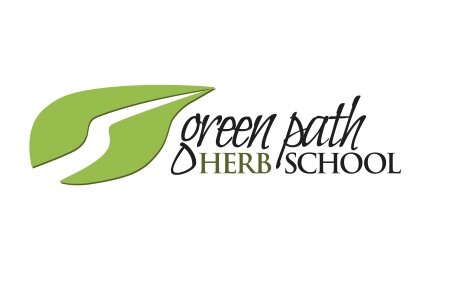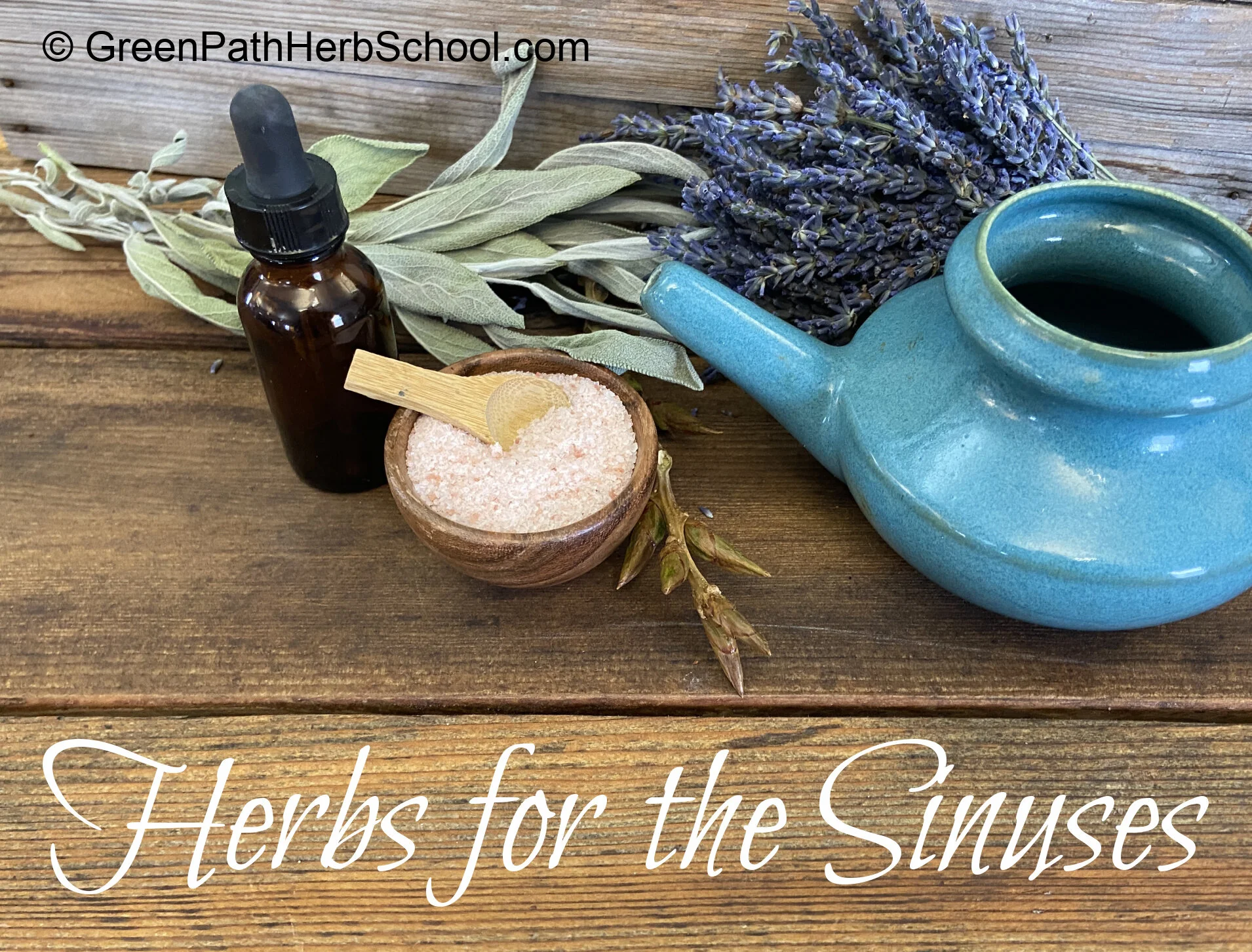Herbs for the Sinuses
If you have ever had a sinus infection, also called sinusitis, you know how debilitating and painful they can be. Sinus infections are most often caused by the common cold. Other triggers include allergies, ear infections, structural abnormalities, and bacterial infections (such as Helicobacter pylori). If an infection has been long term, look for a fungal or dental infection.
Holistic Perspective:
Antibiotics don’t treat sinus infections well. For this reason, I have seen many doctors recommending neti pots to their patients. Neti pots, herbs, and essential oils can be key to resolving sinusitis. Herbs that thin mucus, fight infection, soothe tissues and encourage expectoration are very helpful.
Herbs for the Sinuses:
Below is a list of categories that help to soothe and heal the sinuses. I recommend using herbs both internally and in a neti pot, as well as doing steams with essential oils. Using these treatments a minimum of two times a day is very helpful.
Expectorants:
Help move foreign particles up and out of the lungs by helping the body produce mucus more effectively and sometimes thinning mucus that is too thick
Herbs: Inula helenium (Elecampane), Grindelia spp. (Gum weed), Balsamorhiza sagittata (Balsam root), Populus spp. (Poplar) bud, Marrubium vulgare (Horehound), Verbascum thapsus (Mullein)
Essential oils: Ocimum basilicum (Basil), Styrax benzoin (Benzoin), Citrus bergamia (Bergamot), Juniperus virgiana or Cedrus doedara (Cedarwood), Eucalyptus spp., Foeniculum vulgare (Fennel), Hyssopus officinalis (Hyssop), Origanum majorana (Marjoram), Mentha piperita (Peppermint), Santalum album (Sandalwood), Commiphora spp. (Myrrh)
Decongestants:
Reduce congestion and mucus production. This can help reduce the possibility of an opportunistic infection.
Herbs: Ephedra nevadensis and several other species (Mormon tea), Eriodictyon californica (Yerba Santa), Urtica dioica (Nettles) or Marrubium vulgare (Horehound)
Decongestant essential oils: Rosmarinus officinalis (Rosemary), Eucalyptus spp., Melaleuca alternifolia (Tea Tree), Lavandula spp. (Lavender), Mentha piperita (Peppermint), Ravinsara aromatic (Ravinsara)
Reduce mucus-producing foods: dairy, sugar, wheat, oats, barley and rye.
Demulcents:
Coat and soothe irritated or inflamed membranes to allow healing to begin.
Herbs: Althea officinalis (Marshmallow), Ulmus rubra (Slippery elm), Glycyrrhiza spp. (Licorice), Plantago ovata (Plantain), Viola spp. (Violet) and Verbascum thapsus (Mullein)
Astringents:
Contract irritated, inflamed tissues (such as mucus membranes), helping to protect them and aid in healing and recovery.
Herbs: Solidago spp. (Goldenrod), Achilllea millefolium (Yarrow) flowers and leaves, Leucanthemem vulgare (Oxeye daisy), Ambrosia spp. (Ragweed), Salix spp. (Willow), Filipendula ulmaria (Meadowsweet), Hamamelis spp. (Witch hazel), Myrica spp. (Bayberry), Euphrasia officinalis (Eyebright), Plantago ovata (Plantain), Equisetum spp. (Horsetail), Anemopsis californica (Yerba mansa)
Anti-Virals:
Fight off viral infection.
Herbs: Lomatium dissectum (Lomatium), Ligusticum porteri (Osha), Hyssopus officinalis (Hyssop), Melissa officinalis (Lemon balm), Glycyrrhiza spp. (Licorice)
Essential oils: Thymus vulgaris (Thyme), Rosmarinus officinalis (Rosemary), Mentha piperita (Peppermint), Melaleuca alternifolia (Tea Tree), Eucalyptus spp., Citrus bergamia (Bergamot), Piper nigrum (Black pepper), Melissa officinalis (Lemon balm), Hyssopus officinalis (Hyssop)
Anti-microbials:
Fight off microbial infection.
Herbs: Allium sativum (Garlic), Hydrastis canadensis (Goldenseal), Mahonia spp. (Oregon grape root), Balsamorhiza sagittata (Balsam root), Usnea spp. (Usenea), and Populus spp. (Poplar) bud
Essential oils: Most essential oils are antimicrobial to one or more organisms. Citrus bergamia (Bergamot), Juniperus communis (Juniper) Eucalyptus globulus (Eucalyptus), Melaleuca alternifolia (Tea Tree), Thymus vulgaris (Thyme) linalool, Pelargonium gravolens (Geranium), Syzygium aromaticum (Clove), Mentha piperita (Peppermint)
How to Use a Neti Pot:
Fill the neti pot with 1 cup warm water (filtered or boiled) or herbal tea. You want the water to be about as warm at the water you would use to take a shower.
Add 1/4 teaspoon sea salt, Celtic salt, rock salt, or kosher salt (NOT table salt) and stir until dissolved.
Additional Things you can add:
Tinctures: Add 20–60 drops of an herbal extract
Aloe vera juice: Add 1 teaspoon to soothe irritated mucus membranes
Bend over the sink and tilt your head to one side, placing the spout of the neti pot in the upper nostril, letting the water run out the lower nostril. If the water runs down the back of your throat, tilt your head forward. Sometimes breathing through the mouth can help the net flow better.
After using half of the pot, repeat on the other side.
This process can be done 1–2 times a day.
Formulas for the Sinuses:
Sinus Infection Inhalation:
10 ml Eucalyptus globulus (Eucalyptus) essential oil
10 ml Melaleuca alternifolia (Tea Tree) essential oil
3 ml Syzygium aromaticum (Clove) essential oil
3 ml Mentha piperita (Peppermint) essential oil
2 ml Thymus vulgaris (Thyme) linalol essential oil
2 ml Pelargonium gravolens (Geranium) essential oil
Place your head over a pot of steaming (not boiling) water with a towel covering your head. Add 2-3 drops of Sinus Infection Inhalation and breathe deeply through the nose. Add more as needed.
Sinus Infection Neti Pot Drops:
2 oz Anemopsis californica (Yerba mansa) tincture
2 oz Juglans nigra (Black walnut) tincture
1 oz Hydrastis canadensis (Goldenseal) tincture
1 oz Collinsonia canadensis (Stone root) tincture
1 oz Althea officinalis (Marshmallow) tincture
10 ml Vegetable glycerin
Add 30-60 drops of this blend to a neti pot (typically 1 cup of warm saline water) and irrigate through both nostrils. See above for how to use a net pot.
Sinusitis Spray:
15 drops Mahonia spp. (Oregon Grape Root) tincture
15 drops Echinacea spp. (Echinacea) tincture
10 drops Baptisia tinctoria (Wild indigo) tincture
1/2 teaspoon vegetable glycerine
2 oz saline water
2 ounce sinus spray bottle
Add all ingredients together and shake well. Spray into sinuses, inhaling deeply, up to 4 times per day.
Nasya Nasal Oil:
1 ounce unroasted sesame oil
6 drops of Eucalyptus globulus (Eucalyptus) essential oil
4 drops of Mentha piperita (Peppermint) essential oil
2 drops Melaleuca quinquenervia (Niaouli) essential oil
To Use:
Lay on your back, with a small pillow or rolled towel under your neck. Tilt your head back.
Drop 5-10 drops of nasya oil in each nostril.
Take a big sniff in, then rest for a few minutes allowing the nasya to penetrate.
Gently massage the nostrils, nose and sinuses.
Alternately, if standing or sitting you can place a drop of nasya oil on the little finger and carefully insert it into the nostril, rubbing gently.
Sinus Salts:
¼ cup whole salt (Real Salt works well)
3 drops Rosmarinus officinalis (Rosemary) essential oil
3 drops Melaleuca alternifolia (Tea tree) Essential oil
2 drops Eucalyptus radiata essential oil
Directions: add all essential oils to the salt and mix well in a blender or coffee grinder. Store in a glass jar with a tight fittig lid. Dosage: Add ¼ teaspoon to 1 cup of warm water and mix well. Use in a neti pot for sinus infections, cold, flu and allregies. See above for how to use a net pot.
Sinus Soother:
2 oz Hydrastis canadensis (Goldenseal)
2 oz Yerba Santa (Eriodictyon californica)
1.5 oz Stone root (Collinsonia Canadensis)
1.5 oz Althea officinalis (Marshmallow)
½ oz Salvia officinlais (Sage)
1/4 oz Baptisia tinctoria (Wild indigo)
1/4 oz Armoracia rusticana (Horseradish)
2 oz Vegetable Glycerin
Mix all ingredients together and shake well. This tincture can be used internally by taking 60 drops 3-5 times a day for a head cold or sinus infection. To use it in a net pot, put 30-60 drops in 1 cup of warm saline water and rinse the sinuses. See above for how to use a net pot.

